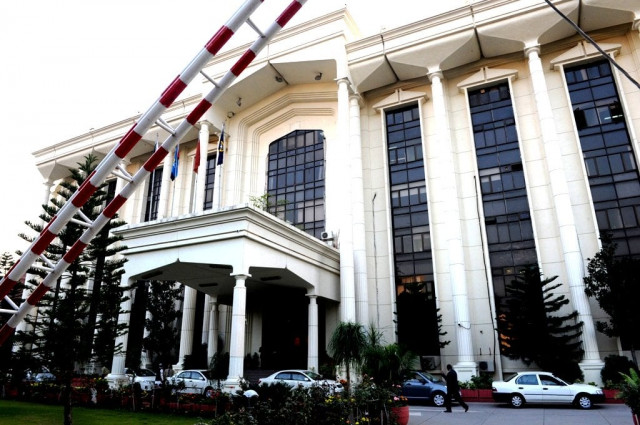FBR in trouble for giving contract to NCSPL
SC upholds high court verdict, orders govt to take action against board officials involved in matter

The Supreme Court has asked the federal government to take action against the Federal Board of Revenue (FBR) officials, who favoured military-operated company NLC Construction Solutions (Pvt) Ltd (NCSPL) when awarding a contract to track and monitor imported cargo and ensure the imposition of applicable customs duties.
The NCSPL is stated to be fully owned by the National Logistics Cell (NLC), which itself is owned by the federal government and is operated by army personnel.
A division bench of the apex court led by Justice Qazi Faez Isa upheld the Sindh High Court judgment wherein the contract was set aside.
A copy of the judgment is sent to the law secretary as well as FBR members for compliance and information.
Justice Isa, while authoring a 25-page judgment, held that the FBR Act, 2007 stated that the primary duty of the body was “to enhance the capacity of the tax system to collect due taxes through application of modern techniques”.
Also read: FBR not pursuing its cases ‘seriously’: SC
"Unfortunately, the facts of the instant case show that the FBR was uninterested in ensuring the integrity of the cargo and that applicable customs duties and taxes thereon are not evaded," the verdict read.
The judgment stated that the FBR was also required to apply modern techniques.
“The tracking and monitoring mechanism of cargo through GPS, as envisaged in the rules, constituted application of modern techniques. If the FBR had followed the rules and had awarded the contract to an independent party, it would have prevented cargo being removed without the payment of the applicable duties and taxes,” it added.
“However, the officers of the FBR decided to select an unqualified, inexperienced and highly conflicted party (NCSPL) and awarded it the contract.”
The court noted that the FBR was also required to operate in an “autonomous” manner and to comply “with tax related laws”. And, to do so by “upholding values of integrity, professionalism, teamwork, courtesy, fairness, transparency and responsiveness”.
However, the court noted that the facts disclosed that the FBR had neither acted autonomously in awarding the contract to the NCSPL, nor complied with the applicable laws.
"Unfortunately, one is also constrained to observe that the FBR ignored the stated values of integrity, professionalism, fairness and transparency. The FBR contravened the law, whereby the FBR was set up, and the rules made by it. And in doing so, the interest of the people of Pakistan was disregarded.”
The court observed that the officers of the FBR took it upon themselves to pursue the interests of the NCSPL instead of those of their department and of the people of Pakistan, “which in the instant case were the same”.
"Therefore, the government is well advised to initiate an inquiry to ascertain the officers who were responsible and complicit in this, and take appropriate action against them in accordance with law, which accountability dictates and goes towards forestalling future misdoings."
The court also noted that the NCSPL was stated to be a fully owned subsidiary of NLC while the latter claimed to be the single largest transporter of cargo in Pakistan.
“The NLC apparently is the alter ego of the federal government therefore the NCSPL would constitute the NLC’s alter ego.”
The court raised the question as to whether or not the NLC, an alter ego of the federal government, could itself own a company. However, this aspect was not raised before the high court, nor was it considered by it, and as such it may not be appropriate to comment on it.
Also read: FBR misses March tax target
“But what is apparent is that granting the contract to the NSCPL, an entity fully owned by the NLC, constituted a momentous conflict of interest. The rules were made to ensure that cargo disembarked at its proper destination and the vehicles carrying it were tracked and monitored throughout their journey, and to ensure that containers were not opened before reaching their destination and cargo removed or pilfered there from. In granting the contract to the largest transporter of containers in the country, the very purpose of the rules was negated. And, all the more so when seriously documented allegations were noted against the NLC.”
The court also observed that the NCSPL would be considered to be the aggrieved party because the contract awarded to it was set aside. However, the NCSPL did not challenge the judgment of the high court.
"Instead the FBR took it upon itself to do so. This is a further indication of complicity between officers of the FBR and NCSPL, and severely undermines the credibility and standing of both," the judgment read.
The court also noted that the NCSPL neither possessed the requisite licence under the rules, nor was it compliant with their requirements.
“Binding legal precedents, expounding on the procurement laws, were also disregarded by the FBR. The FBR also contravened the bidding procedures. The NCSPL was brought in through the proverbial backdoor without having participated in the bidding process. The NCSPL had no experience to track and monitor cargo nor did it have the requisite technical skills. The material bidding terms were changed, diluted and retailored for the NCSPL and this was done to enable the FBR to award it the contract. The FBR is supposed to safeguard the interest of the exchequer and of the citizens but it subverted them to benefit a highly conflicted company.”
The court dismissed the FBR petition with a cost.



















COMMENTS
Comments are moderated and generally will be posted if they are on-topic and not abusive.
For more information, please see our Comments FAQ